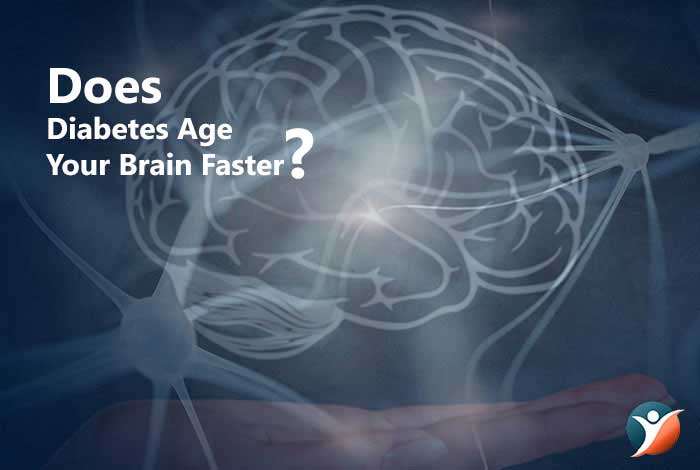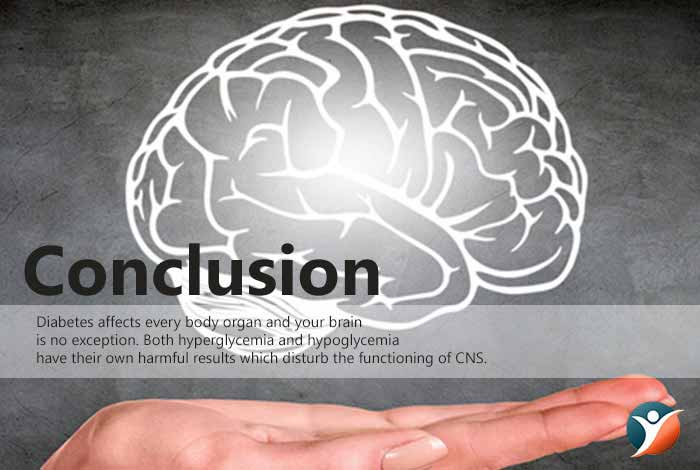
Diabetes and Your Brain – The Effects

Diabetes and its high blood sugar level spikes have a harmful impact on whole body functioning, your intellect (brain) is no exception. Effects of diabetes on your brain or in other words the connection between diabetes and brain can or cannot be visibly seen over years and you’ll experience the changes which may be drastic.
The human brain is a complex thing to understand but it very sensitive to low and high blood sugar levels because it requires oxygen and glucose to function. Diabetes can sabotage this natural cycle by bringing about abnormalities in the blood glucose levels.
Diabetes acts as a double-edged sword as both hyperglycemia and hypoglycemia can negatively affect the brain due to fluctuations in natural glucose levels.
If you’re a diabetic, then taking care of your brain should be on your list of reasons to keep diabetes under control.
Diabetes and Brain: Effects of High Blood Glucose on The Brain
High blood sugar levels cause a long-term damage to brain’s blood vessels over time. It interrupts connectivity and disturbs normal mental functions. Over years it damages your thought process which is known as vascular dementia or vascular cognitive impairment.
Several studies reported that the longer you have diabetes, the more you develop the chances of cognitive impairment. A research study done at Harvard Medical School, Boston [1]reported that “Type 2 diabetes” is related with subcortical and cortical atrophy in the brain.
Another study published in the Official Journal or the American Academy of Neurology also found a link between diabetes development and cognitive impairment.
Both these studies are the proof that diabetes-related-inflammation can damage cerebral vaso- regulation leading to a decline in brain functioning and negatively affect your performance in other day-to-day activities.
Apart from damaging overall cognitive health and functions, diabetes also affects your memory, which results in poor reasoning power in intellect tasks.
The Effects of Low Blood Glucose on Brain
From the above discussion, now we know that high blood sugar levels can cause mental health trouble but what about the effects when your blood sugar is low?
People with type 2 diabetes using insulin therapy and other medications are much likely to get affected by hypoglycemia. And it is a proven fact that low blood sugar has more harmful effects on your brain than its higher values.
Low blood glucose can also affect your mood, thinking, result in poor coordination, cause dizziness, nausea, clammy skin, shakiness, hunger and sometimes a pounding heart.
Moreover, a study (on rats) conducted at Washington University found that both moderate and severe hypoglycemia can lead to cognitive impairment. So, taking low blood sugar levels lightly could be a big mistake.
Diabetes and Brain: Does Diabetes Age Your Brain Faster?

Yes, diabetes ages your brain faster. Several studies have reported that people with diabetes in their 50’s are more likely to face mental decline by the age of 70’s which reveals that diabetes does affect cognitive function, mental abilities to age your brain faster.
Diabetes severely affects your Central Nervous System (CNS) like natural aging does. Scientists reported the relation between CNS changes due to diabetes and aging which have the evidence to prove the theory of advance brain aging in diabetes patients.
The Connection Between the Brain and Alzheimer’s & Diabetes
Research in the field of diabetes, as well as Alzheimer, suggests a strong relationship between Alzheimer’s disease and diabetes as well as dementia. Diabetics are more susceptible to developing conditions such as Alzheimer as compared to other people of the same age without diabetes. Experts even denoted it as Type 3 diabetes due to the connection and cases of dementia and Alzheimer in diabetics.
Studies also linked both Alzheimer and diabetes with oxidative stress. However, mitochondrial dysfunction, insulin resistance, and inflammation are common in both type 2 diabetes and Alzheimer’s disease.
What to Do?
You need to follow a diabetes diet and work on holistic ways to reverse the effects of diabetes. Try to minimize the harm as far as possible and reduce the risk of mental decline at an early age. Even some studies also reported that preventing diabetes can help to control blood glucose and protect against mid and late-life cognitive functioning issues.
Conclusion

Diabetes affects every body organ and your brain is no exception. Both hyperglycemia and hypoglycemia have their own harmful results which disturb the functioning of CNS.
People with diabetes are more likely to suffer from cognitive issues and face mental decline at an early age. Diabetes also fastens the brain aging which results in loss of performance in mental tasks.
Alzheimer and dementia are end-stage damage that diabetes can cause to your brain and people with diabetes are 30% more susceptible to these serious health conditions. So, if you have diabetes and actually wish to minimize the risks in later-life, following a healthy lifestyle and strictly focusing on your end goals will definitely help.
If you loved the information or helped you to protect your mastermind against diabetes. Do share the information with your family and friends, you can also help us to improve with your loving suggestions in the comment section below.




